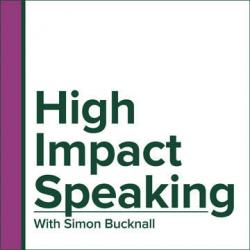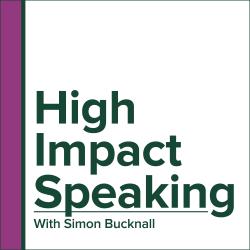Saturday 13th May 2006...
A hotel ballroom in Mullingar, Ireland...
The Final of the GB & All-Ireland Championship of Public Speaking.
500 people in the audience.
I knew my speech inside-out, back-to-front.
But then, 1 minute into my speech, it happened.
My mind went blank.
Rien. Nothing. Nada.
What do you do?
In presentations? In meetings? In interviews?
*
It's one of the most feared communication challenges professionals face.
Do you panic? Walk off? Hand over to someone else? Ask for a break?
Blow your nose?
It won't surprise you to hear that...
There is no magic pill to eliminate this issue.
What you CAN do is give yourself options.
That way, even if your mind does go blank, you'll remain calm.
Maintaining composure and professionalism is the critically important first step.
Remember: it's OK for the mind blank to happen.
It's not something to feel guilty about.
Why?
Because all your listeners care about is that you find a way to get back on track.
Here are some options for you to consider...
1 Remember to Breathe!
When under stress, we have a natural tendency to stop breathing properly. By consciously reminding yourself to take a breath, you...
- Give yourself something to do
- Buy yourself some time
- Help your brain out with much needed oxygen
- Are more likely to stay calm
2 Pause for Thought... in Silence
The silence may feel excruciating - but more so for you than for your listener.
Pause. Gaze into space if you need to... there's a chance your train of thought will come back to you.
3 Use your Neutral Stance
Physically regroup - this may mean shifting your position, regaining your balance, deciding what do with your hands. Whatever it taks to physically regain your compusure while you decide what to do next.
If a speaker flaps around, starts shuffling around to no purpose, it doesn't help anyone.
4 If That Still Doesn't Help... THEN Move (with purpose)
Movement does help to reduce adrenaline.
If you're standing, take a few steps to a different part of the speaking space. This breaks the 'rabbit-in-headlights' feeling. Crucially, it gives you something to do while your mind regroups. It also gives the audience something to do, too!
If you're sitting down, consider your options for smaller scale movements. Perhaps pull up your chair, push your chair back from the table, take a sip of a glass of water, move some papers around or simply stretch your back and resettle yourself. See what works for you.
Moving to a different part of the stage was vital in helping me get back on track in the speech contest.
5 Take Another Run-Up
When the mind goes blank, it can feel a bit like standing on the edge of a canyon...
Grasping at thin air, desperately searching for the elusive next sentence that will get you to the other side.
Wait long enough and eventually you'll topple in!
What if instead you have another run-up? In other words, repeat, re-emphasise or summarise what you've just been saying. This is much easier for your brain to do. It also buys you time and gives fresh momentum for breaking through the blockage.
*
Back in Mullingar, Ireland in the speech contest...
I paused.
Walked across the stage.
Thankfully, my flow did come back to me.
But the intervening five seconds of silence felt like eternity - seriously.
Later that afternoon, having won the contest, audience members came up to me and said:
"We loved your use of pauses!"
| 



